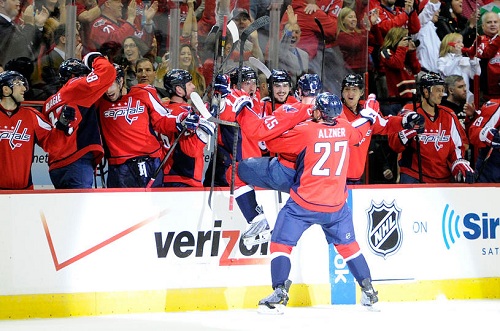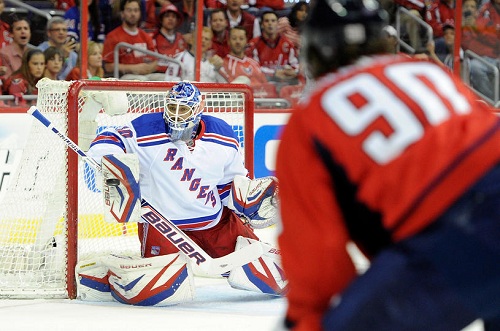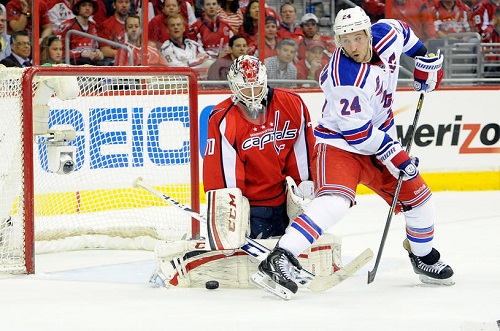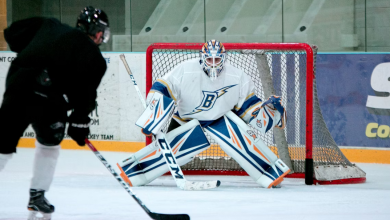Rocked By The Red

The Eastern Conference Quarterfinals series between the Rangers and Capitals was the last series among the eight in the East to get underway in 2013. One thing that both Rangers Coach John Tortorella and Captials Coach Adam Oates talked about leading up to the series was setting the tone from the beginning of the first game. Both teams had a long layoff, having not played for five days since their last regular season games. An early Rangers blunder allowed Washington to set the tone within the first minute of the first game, and to go on to take the first game in this best-of-seven series by a score of 3-1.
One of the Washington Capitals’ strengths from the regular season was their power play. Converting at a rate of 26.8%, the last thing the Rangers wanted to do was take an early penalty. A mere 34 seconds in to the opening frame, the Blueshirts took a bench minor for too many men on the ice. While the Capitals failed to convert the opportunity, they were able to use the man-advantage to make Henrik Lundqvist work. The Caps fired off nine shots on the Rangers net-minder (three on the power play) before the Rangers were able to get their first shot on goal at 8:07 in to the period. After the teams traded some shots and the Capitals killed off a Jay Beagle boarding penalty, the Rangers would get on the board first. Twenty-three seconds after Beagle came out of the penalty box, Rangers winger Carl Hagelin scored on a wrap-around goal (that went off the skate of Capitals D John Erskine, assisted by Ryan Callahan & Ryan McDonagh) to give New York their only lead of the night.

(Greg Fiume – Getty Images)
Washington started off the second period on the power play due to a late Ryan McDonagh holding penalty in the first period. This would begin a streak of three straight Capitals power plays in the 2nd period. The Rangers killed off the McDonagh and Taylor Pyatt penalties, but the third time was the charm for the Caps. An Arron Asham penalty led to Alexander Ovechkin’s first goal of the playoffs (assisted by Mike Green & Nicklas Backstrom) at 6:59 of the period to even the game at one.
The special-teams fest continued on through the second period. The Capitals penalty kill went to work at 9:40 of the frame, first with a Martin Erat boarding penalty. A little over a minute after that, Eric Fehr was also sent to the box for interfering with Ryan Callahan (both would get matching roughing penalties as well), and the Rangers had a golden opportunity with a 5-on-3 for 56 seconds, and another 1:04 of power play time after that. The Rangers managed to pepper Caps goalie Braden Holtby with five shots on the extended opportunity (two other shots were blocked, a stretch of three other shots went wide), but Holtby kept the Rangers at bay. The momentum of a successful penalty kill carried over to even strength, and the Caps scored two goals within 45 seconds of one another. The first goal came when Capitals D Steve Oleksy found Marcus Johansson behind all of the Rangers skaters with a long pass to give the Caps the lead for good. After that, Henrik Lundqvist was beaten by a long shot (that should have been stopped) from Jason Chimera along the sideboards (Mathieu Perrault on the assist). Chimera has been a Rangers-killer in the playoffs – six of his eight career playoff goals have come against the Blueshirts.

(Greg Fiume – Getty Images)
The Capitals offense in the second period was key, but the way Braden Holtby played between the pipes for Washington was the difference in the victory. After stopping seven of eight first period shots, Holtby made 28 saves the rest of the way to get the Capitals to a 1-0 series lead. There was a questionable no-goal called on a John Moore shot with just over four minutes remaining. It looked as if the shot from the Rangers defenseman had beaten Holtby, trickled down his back, and that he pulled the puck back with his glove. But with no clear view of the puck (his glove blocked the cameras view), it was deemed inconclusive.

(Greg Fiume – Getty Images)
If the Rangers want to come back to Madison Square Garden with the series tied at one, they need to stay out of the box. With the rate of success the Capitals power play had this season, giving them five power play opportunities is playing with fire. Secondly, and this has been the Achilles Heel of the Rangers for most of the season, their power play needs to convert. There were quality opportunities and enough shots towards the net, but not having big bodies like Ryane Clowe and Brian Boyle to create screens hurts. For the first time this season, the Rangers lost a game in regulation after having a 1st period lead (13-0-1 heading in to the game).
Game 2 is Saturday afternoon at 12:30 p.m. EST in Washington, and can be seen on NBC in the United States and TSN in Canada.

